Eleven retiring faculty members have been elected to emeritus status and will be recognized at the 180th Commencement on May 23.
Enjoy more Commencement coverage
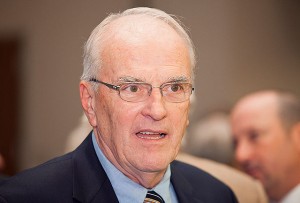
Jerome Heavey
Jerome Heavey, professor emeritus of economics, retired effective Jan. 1, 2015. He had been a member of the faculty for 42 years. He received a bachelor of science degree in English literature from St. Joseph’s University in 1970 and master’s and doctoral degrees in economics from Penn State University in 1971 and 1976, respectively.
Heavey joined the faculty in 1973. He taught courses in econometrics, intermediate microeconomic theory, economics of the public sector, managerial economics, the economic history of Russia in the 20th century, the economic landscape of English literature, game theory, urban economics, and Irish economic history, among others. He developed and taught interim-session courses on public-sector collective bargaining, game theory, and the land and landscape of Ireland.
Heavey’s research interests include state and local public finance, Social Security, Georgist economics, and Irish land issues. He is the author of articles in the American Journal of Economics and Sociology, Journal of Australian Political Economy, Public Finance Review, The Journal of Economic Education, and other scholarly publications, and of book chapters.
In 1995, he served as a senior adviser to the Fiscal Reform Project of the Moscow Oblast Finance Committee in Russia. The same year he was awarded a Fulbright Lectureship at the University of Warsaw, which he declined. He was a visiting scholar in the Department of Political Economy at the University of Sydney and in the Department of Agricultural Economics at University College in Dublin. He was a Sloan Fellow in the Department of City and Regional Planning at Harvard University.
Heavey served as department head from 1982 to 1985 and from 1997 to 2003 and as acting head in 1980 and 1996. He also served as a mentor for Posse Scholars.
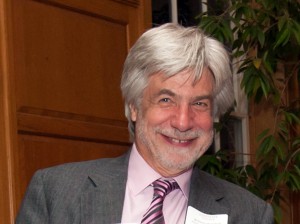
William Hornfeck
William Hornfeck, professor emeritus of electrical and computer engineering, retired effective Jan. 1, 2015. He had been a member of the faculty for 27 years. He received a bachelor of science degree in electrical engineering from Penn State University in 1966 and master’s and doctoral degrees in electrical engineering from Auburn University in 1969 and 1971, respectively.
Hornfeck joined the faculty in 1988 as department head and professor of electrical and computer engineering after serving as a professor at Mississippi State University and as an assistant professor, associate professor, and program director at Gannon University. He also served as aerospace technologist in the Flight Support Division of NASA’s Johnson Space Center in Houston and as a computer scientist in the Systems Division of Computer Sciences Corp., Huntsville, Ala.
Hornfeck’s teaching areas include electric circuits, computer arithmetic circuits, and energy systems. He has taught his First-Year Seminar on energy technologies each year since its inception in 1995. After serving 14 years as department head, he turned his teaching interest to international education. He led six semester-long programs, one in Brussels and five in Bremen, taking approximately 150 students to study abroad. He is the recipient of the College’s Christian R. and Mary F. Lindback Foundation Award for excellence in teaching and outstanding contributions to campus life.
His research interests include computer architecture and energy resources, uses, and technologies. During his career as an educator Hornfeck has been an engineering consultant to General Electric, the U.S. Army, Navy, and Air Force, Federal Energy Technology Center, and National Aeronautics and Space Administration.
He has authored many scholarly articles and presented papers at many conferences. His honors include membership in Eta Kappa Nu, Sigma Xi, Phi Beta Kappa, and Tau Beta Pi. His service to Lafayette includes membership on several College committees.
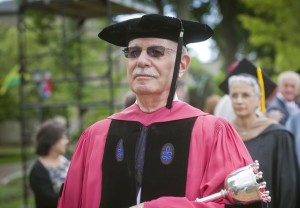
Guy Hovis
Guy Hovis, John H. Markle Professor Emeritus of Geology, retired effective Jan. 1, 2015. He had been a member of the faculty for 41 years. He received a bachelor of arts degree in geology from Franklin and Marshall College in 1964 and master’s and doctoral degrees in geology from Harvard University in 1967 and 1971, respectively.
Hovis joined the faculty in 1974 as assistant professor of geology and was promoted to associate professor in 1978 and to full professor in 1984. He was named Markle Professor in 1991.
He taught introduction to geology and courses on mineralogy, igneous and metamorphic petrology, and geochemistry, among others. He is the recipient of the College’s Mary Louise Van Artsdalen Prize for outstanding scholarly achievement, Thomas Roy and Lura Forrest Jones Award for superior teaching and contribution to his discipline, and Thomas Roy and Lura Forrest Jones Lecture Award in recognition of excellence in teaching and scholarship.
Hovis’ research interests include mineralogy, thermodynamic properties of earth materials, X-ray powder diffraction, solution calorimetry, and high-temperature geochemistry. Since 1976, he has been awarded continuous grants, totaling $1.6 million, by the National Science Foundation supporting his research. He has mentored dozens of students in independent studies, summer research projects, EXCEL Scholars research, and honors theses.
Hovis served as director of the NSF’s Petrology and Geochemistry Program from 1990 to 1992. He was named a life fellow of the Mineralogical Society of America in 1991 and was elected to life membership in Clare Hall, Cambridge University, in 1998.
As a member of the All-College Tenure Committee in the 1980s, Hovis played a central role in the establishment of Lafayette’s merit-based tenure system. He served as department head from 1997 to 2000 and as acting head in spring 1982, fall 1982, and the 1993-94 academic year. He also served as Bearer of the Mace in the academic procession at several Commencement ceremonies. The processional mace is carried by the faculty member senior in rank of full professor.
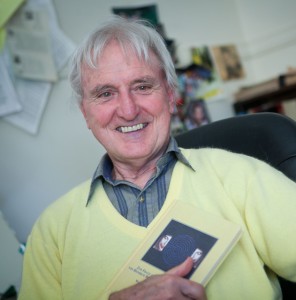
Edward McDonald
Edward McDonald, professor emeritus of foreign languages and literatures, retired effective Jan. 1, 2015. He had been a member of the faculty for 51 years. He received a bachelor of arts degree in German language and literature from St. Peter’s College in 1961 and master’s and doctoral degrees in Germanic languages and literatures from Columbia University in 1963 and 1969, respectively.
McDonald joined the faculty as an instructor of German in 1964. He was promoted to assistant professor in 1969, associate professor in 1973, and full professor in 1992.
He taught dozens of courses in German language, literature, culture, and civilization—in fact, virtually every course offered by the German section of the Department of Foreign Languages and Literatures during the last half-century. A course he developed and taught several times in Austria, Hungary, and Germany was the College’s first interim-session abroad course. He also developed and taught three First-Year Seminars and one VAST (Values and Science/Technology) Seminar. He is the recipient of the College’s Thomas Roy and Lura Forrest Jones Lecture Award in recognition of excellence in teaching and scholarship.
McDonald is the author of two book-length monographs. He also has published many articles, book chapters, and book reviews and delivered many invited lectures, including talks at the University of Warsaw and Jagiellonslki University in Cracow. His awards and honors include a Fulbright Grant and a summer fellowship to the German Democratic Republic from the GDR’s League for Friendship Among Nations.
McDonald served as coordinator for German within the Department of Foreign Languages and Literatures from 1970 to 1990 and was coordinator for Russian in 1987-88. He served on many College committees.
The College’s Edward R. McDonald Prize was established in his honor this year. It will be awarded annually to juniors or seniors who have exhibited high academic achievement in the acquisition of a second language, other than English, and the study of its literature and cultural production.
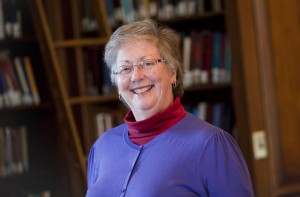
Susan Niles
Susan Niles, professor of anthropology in the Department of Anthropology and Sociology, has been a member of the faculty for 34 years. She received a bachelor of arts degree in anthropology from the University of Wisconsin, Madison, in 1974 and master’s and doctoral degrees in anthropology from the University of California, Berkeley, in 1976 and 1980, respectively.
Niles joined the faculty in 1981 as an assistant professor and was promoted to associate professor in 1988 and to full professor in 1996. Among many other courses, she developed and taught an interim-session course in New Zealand. She also developed and led the College’s semester-long study program in Guatemala. She is the recipient of the College’s Marquis Distinguished Teaching Award, Thomas Roy and Lura Forrest Jones Award for superior teaching and contribution to her discipline, Thomas Roy and Lura Forrest Jones Lecture Award in recognition of excellence in teaching and scholarship, and Student Government Superior Teaching Award.
Niles’ research interests include Inca cultural history, Andean anthropology and archeology, vernacular architecture, pre-Columbian art and architecture, folklore method and theory, and preservation of cultural patrimony. She is the author of four books, South American Indian Narrative, Theoretical and Analytical Approaches: An Annotated Bibliography (Garland Publishing, 1981), Callachaca: Style and Status in an Inca Community (University of Iowa Press, 1987), Dickeyville Grotto: The Vision of Father Mathias Wernerus (University Press of Mississippi, 1997), and The Shape of Inca History: Narrative and Architecture in an Andean Empire (University of Iowa Press, 1999).
Among other support for her work, Niles received the Ailsa Mellon Bruce Senior Fellowship from the National Gallery of Art and residential fellowships at the John Carter Crown Library and at the School for American Research, both funded by the National Endowment for the Humanities. She was elected a member of the Institute of Andean Research and a fellow of the Institute of Andean Studies.
Niles’ service to the College includes the role of Clerk of the Faculty from 2008 to 2014. She was director of the Marquis Scholars program from 1993 to 1997.
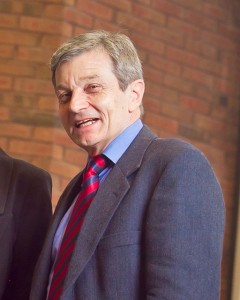
Rado Pribic
Rado Pribic, Oliver Edwin Williams Professor Emeritus of Languages, retired effective Jan. 1, 2015. He had been a member of the faculty for 44 years. He received a bachelor of arts degree in German and Russian from Florida State University in 1968 and master’s and doctoral degrees in German, Russian, and comparative literature from Vanderbilt University in 1970 and 1972, respectively.
Pribic joined the faculty in 1971 as an instructor of languages. He was promoted to assistant professor in 1973, associate professor in 1977, and full professor in 1989. He was named Williams Professor in 2000.
In addition to courses in German and Russian language and literature, comparative literature, and international relations, Pribic taught interim-session courses in Vienna, the Soviet Union, Russia, Italy, and Berlin, Prague, and Munich. He also directed semester-long study programs in Brussels and Bremen. He is the recipient of the College’s Marquis Distinguished Teaching Award, Delta Upsilon Distinguished Mentoring and Teaching Award, Christian R. and Mary F. Lindback Foundation Award for excellence in teaching and outstanding contributions to campus life, Thomas Roy and Lura Forrest Jones Lecture Award in recognition of excellence in teaching and scholarship, and Daniel L. Golden ’34 Faculty Service Award.
Pribic’s research interests include Germano-Slavic literary, linguistic, and cultural relations; 19th-century German and other European prose; Romanticism; Dostoevsky; alienation in literature; and East-West European relations. He is the author of Bonaventura’s “Nachtwachen” and Dostoevsky’s “Notes from the Underground”: A Comparison in Nihilism (Otto Sagner, 1974) and The Trouble with German Unification: Essays on Daniela Dahn (NoRa, 2008). He is the editor and/or translator of three other books and author of many scholarly articles.
Pribic is the recipient of grants from the National Endowment for the Humanities, Fulbright Foundation, and Goethe Institute in Berlin, among other national and international agencies. He was a member of the Board of Advisors of the Citizen Exchange Council from 1974 to 1998. The Pennsylvania Council for International Education presented him with its W. LaMarr Kopp Lifetime Achievement Award, for which he also was honored by the Pennsylvania House of Representatives.
Pribic served as chair of the International Affairs Program from 1989 to 2013 and as coordinator of the Russian and East European Studies Program from 1993 to 1996 and 1998 to 2006. Within the Department of Foreign Languages and Literatures he was coordinator of Russian and coordinator of German. He also served many years as international students adviser. In his honor, colleagues and former students established the Pribic Study Abroad Scholarship Fund.
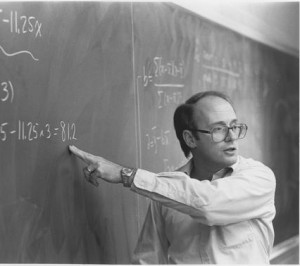
J. Randolph Stonesifer
J. Randolph Stonesifer, associate professor emeritus of mathematics, retired effective Jan. 1, 2015. He had been a member of the faculty for 40 years. He received a bachelor of arts degree in mathematics from Dartmouth College in 1969 and a doctorate from California Institute of Technology in 1973.
Stonesifer joined the faculty in 1975 as an assistant professor of mathematics and was promoted to associate professor in 1981. He served as a visiting assistant professor at Kenyon College for two years before coming to Lafayette.
He taught courses in linear programming, operations research, mathematical modeling, abstract algebra, combinatorics, probability, linear algebra, applied statistics, and calculus, among others. His scholarly publications include articles in the Journal of Combinatorial Theory, Discrete Mathematics, and Algebra Universalis. He was cited by Bernard Fried, Kreider Professor of Biology, for assistance with statistical analysis in scholarly articles and research notes.
In fall 1982, Stonesifer served as a visiting fellow in the Department of Operations Research and Industrial Engineering at Cornell University.
Stonesifer served as secretary or president of the College’s chapter of Phi Beta Kappa for more than 20 years. His service to Lafayette also includes assisting the Office of the Registrar in creating and implementing a method for placing students into their most desired First-Year Seminar and VAST courses.
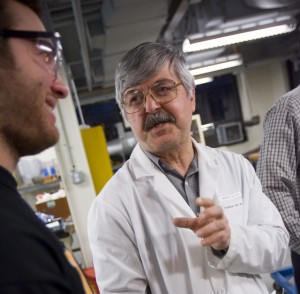
Javad Tavakoli
Javad Tavakoli, professor emeritus of chemical and biomolecular engineering, retired effective Jan. 1, 2015. He had been a member of the faculty for 27 years. He received a bachelor of science degree in chemical engineering from Shiraz University, Iran, in 1973, a master of science degree from Illinois Institute of Technology in 1978, and a doctorate from New Jersey Institute of Technology in 1988. He is a licensed professional engineer in Pennsylvania.
Tavakoli joined the faculty in 1988 as a visiting assistant professor. He became an assistant professor in 1989 and was promoted to associate professor in 1994 and to full professor in 2007. He was a research scientist at M.L. Energia, Plainsboro, N.J., for two years before coming to Lafayette.
Tavakoli’s teaching areas include kinetics and reactor design, chemical engineering laboratories, unit operations, chemical processes in environmental engineering, and alternative energy sources. His research interests include application of chemical engineering principles to environmental and energy-related issues, renewable energy sources, catalytic conversion of methanol to oxygenates, industrial wastewater treatment, and hazardous waste treatment.
The recipient of grants from the American Chemical Society and National Science Foundation, among other agencies, Tavakoli published articles in Journal of Green Building, Journal of Environmental Science and Technology, Separation Science and Technology, and other scholarly journals. He reviewed books on energy-related topics for Choice: Current Reviews for Academic Libraries, published by the American Library Association, and reviewed articles for a number of scholarly publications.
Tavakoli served as an ABET program evaluator from 2006 to 2014. Among other service to Lafayette, he served as department head from 2000 to 2005 and as a mentor to Posse Scholars.
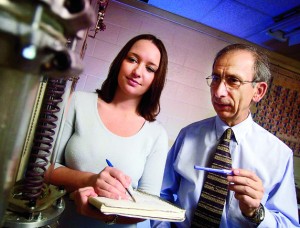
Erol Ulucakli
M. Erol Ulucakli, associate professor of mechanical engineering, has been a member of the faculty for 27 years. He received a master of science degree in mechanical engineering from the Technical University of Istanbul, Turkey, in 1961 and a doctorate in mechanical engineering from the University of Michigan in 1987.
Ulucakli joined the faculty in 1988 as an assistant professor and was promoted to associate professor in 1995. He was a visiting research scientist in the Institute of Thermo-Fluids Engineering and Science at Lehigh University for three years while teaching at Lafayette.
Ulucakli’s teaching areas include thermodynamics, fluid mechanics, heat transfer, and biomedical engineering. He developed and taught an interim-session course in Turkey (Anatolia: The Cradle of Civilizations) and led semester-long programs in Brussels and Bremen. He developed a First-Year Seminar called Engineers of Dreams: The Builders of Flying Machines, Automobiles, and Bridges and a VAST course on climate change. He has served as adviser to many students in honors and EXCEL Scholars research and was the leader of the West Ward Urban Ecology Project supported by the Wells Fargo Regional Foundation and Air Products and Chemicals.
His research interests include heat transfer, fluid mechanics, biomedical engineering, and hydrogen embrittlement of metals. The recipient of a grant from the National Science Foundation, he is co-author of the book Design Guidelines for Hydrogen Piping and Pipelines (American Society of Mechanical Engineers, 2006). He is the author of articles in the Journal of Fluid Mechanics, Journal of Heat Transfer, and other scholarly journals and has presented papers at many conferences.
The former chair of the Anthracite-Lehigh Valley Section of the American Society of Mechanical Engineers, Ulucakli served many years as organizer of the Advances in Aerospace Technology track of ASME’s International Mechanical Engineering Congress and Exhibition.
He has served the College as a member of many committees and, in 2005-06, as coordinator of the Marquis Scholars faculty advisers.
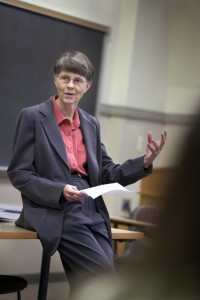
Carolynn Van Dyke
Carolynn Van Dyke, Francis A. March Professor Emerita of English, retired effective Jan. 1, 2015. She had been a member of the faculty for 35 years. She received a bachelor of arts degree in English from Grinnell College in 1969 and a doctorate in English from Yale University in 1973.
Van Dyke joined the faculty in 1980 as an assistant professor of English and served in that role until 1984, when she became an assistant professor of computer science. She was promoted to associate professor of computer science in 1988. She became an associate professor of English in 1990 and was promoted to full professor in 1997. She was named March Professor in 2003.
Van Dyke’s teaching areas include writing, core courses for the English major, linguistics, medieval literature, women’s studies, and computer science. She is the recipient of the College’s Marquis Distinguished Teaching Award, Christian R. and Mary F. Lindback Foundation Award for excellence in teaching and outstanding contributions to campus life, and Thomas Roy and Lura Forrest Jones Lecture Award in recognition of excellence in teaching and scholarship.
Van Dyke’s research interests include Middle English literature and medieval representations of nonhuman animals. She is the author of two books, The Fiction of Truth: Structures of Meaning in Narrative and Dramatic Allegory (Cornell University Press, 1985) and Chaucer’s Agents: Cause and Representation in Chaucerian Narrative (Fairleigh Dickinson University Press, 2005). She is editor of Rethinking Chaucerian Beasts (Palgrave Macmillan, 2012). The recipient of a grant from the National Endowment for the Humanities, she also has made many conference presentations.
The College’s Professor Carolynn Van Dyke Prize was established in her honor in 2002. It is awarded annually to a student, with preference given to computer science majors, to provide funds for a nontraditional learning experience. She was named Outstanding Woman of the Year by the Lehigh Valley Association for Academic Women in 1997.
Van Dyke served as head of the English Department from 1997 to 2001. She was associate head of English from 1993 to 1997 and in the 2001-02 academic year. She was head of computer science from 1988 to 1990 and in spring 2005. She was coordinator of the Women’s Studies Program in 1993-94 and from 2006 to 2008. Her service to the College also includes membership on many committees.
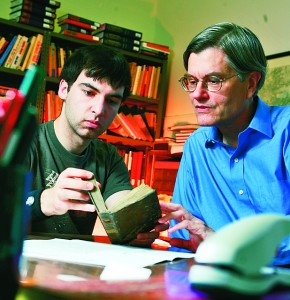
James Woolley
James Woolley, Frank Lee and Edna M. Smith Professor Emeritus of English, retired effective Jan. 1, 2015. He had been a member of the faculty for 34 years. He received a bachelor of arts degree from Wake Forest University in 1966 and master’s and doctoral degrees from the University of Chicago in 1967 and 1972, respectively.
Woolley joined the faculty in 1980 as an assistant professor. He was promoted to full professor in 1992 and named to the Smith Professorship in 1996.
Woolley’s teaching and research fields include the literature and social history of the long 18th century (1660-1820), satire, the novel, poetry, songs, literary research methods, the history of the book, digital humanities, and analytic bibliography. He is the recipient of the College’s Christian R. and Mary F. Lindback Foundation Award for excellence in teaching and outstanding contributions to campus life, Thomas Roy and Lura Forrest Jones Award for superior teaching and contribution to his discipline, Thomas Roy and Lura Forrest Jones Lecture Award in recognition of excellence in teaching and scholarship, and Student Government Award for Superior Teaching.
The recipient of fellowships from the Guggenheim Foundation, National Endowment for the Humanities, and American Council of Learned Societies, Woolley is the author of Swift’s Later Poems: Studies in Circumstances and Texts (Garland, 1988), co-editor of Swift and His Contexts (AMS Press, 1989), and editor of Jonathan Swift and Thomas Sheridan: The Intelligencer (Oxford University Press, 1992).
Woolley served as Clerk of the Faculty from 1997 to 2008. From 1989 to 1998 he was head, acting head, assistant head, or associate head of the English department and again served as associate head from 2010 to 2013. He was a member of the Presidential Search Committee that identified Daniel Weiss as the College’s 16th president.











2 Comments
Comments are closed.